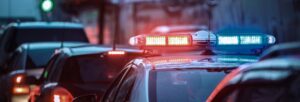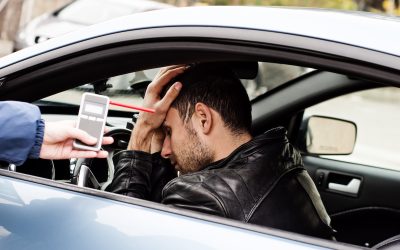
Police officers often consider problems maintaining proper lane position, issues with braking or speed, and slow or incorrect reactions to other drivers as signs of intoxication.
These behaviors behind the wheel can cause a police officer to stop a driver to determine if the motorist is driving under the influence of alcohol. You can learn more about what law enforcement officers look for before a traffic stop with a Los Angeles DUI lawyer.
A defense lawyer can also help you review your options for a defense if the police arrest you for drunk driving.
Driving Patterns That Could Indicate Intoxication
The National Highway Traffic Safety Administration (NHTSA) provides a list of driving patterns that can lead to the visual detection of DWI motorists. All the cues can be observed visually simply by watching a car from a distance.
These cues provide information about the driving patterns police look for as signs of intoxication. Those 24 cues fall into four broad categories:
Problems Maintaining Proper Lane Position
Police officers may try to identify drunk drivers by paying attention to motorists who cannot maintain proper lane positions. For example, officers may suspect impaired driving if a motorist is:
- Weaving
- Crossing lane lines
- “Straddling” a lane line
- Swerving
- Turning too wide
- Drifting
- Nearly hitting a vehicle or object
These forms of erratic driving could lead to a traffic stop for driving under the influence (DUI)
Speed and Braking Problems
Police officers may consider issues with speed or braking as signs of impairment. They look for:
- Any difficulty stopping—such as stopping too soon, waiting too long to stop, or stopping in a jerky manner
- Accelerating or decelerating for no reason
- Varying speed
- Driving too slow (10 or more miles under the speed limit)
These behaviors could result in an officer pulling a driver over because they are some of the driving patterns police look for as signs of intoxication.
Note that some of these actions, like speeding, can lead to other penalties. California’s basic speed law controls how fast motorists can legally drive on public roadways.
Vigilance Problems
Inattentive driving may indicate a sign of impairment to the police. Examples of vigilance problems include:
- Driving in the oncoming lane or going the wrong way on a one-way road
- Responding slowly to traffic signals (sitting at a green light)
- Reacting slowly to an officer’s signals
- Stopping in the lane for no apparent reason
- Driving with no headlights at night
- Failing to use a turn signal or using it in a way that does not match actual turns or lane changes
These actions may indicate impaired driving by a motorist. Additionally, some of these actions can lead to reckless driving accusations and penalties for endangering other motorists.
Judgment Problems
Drivers may demonstrate issues with judgment if they:
- Follow another driver too closely
- Make improper or unsafe lane changes
- Make illegal or improper turns (such as turning too fast)
- Drive off the roadway
- Stop inappropriately in response to an officer (such as swerving off the road when the siren comes on)
- Engage in inappropriate or unusual behavior in the car (such as arguing or throwing things)
As you can see, some of these cues are very general. Officers learn that if they observe two or more signs of intoxication, they may need to make a stop for drunk driving.
What Happens if an Officer Sees Signs of Intoxication?
A police officer may pull you over if they see signs of intoxication. Police are only supposed to pull you over if they have “reasonable suspicion” that you have committed a crime. This suspicion gives them probable cause to make a stop.
Officers have a valid reason to stop you if you break any law while driving, such as speeding. They may not even suspect you were intoxicated until after they pull you over and talk to you.
However, once an officer stops you, they can look for signs of intoxication, like the smell of alcohol or bottles of alcohol in your vehicle. They may also perform field sobriety testing or request that you submit to a blood alcohol content (BAC) test.
What Are Other Signs of Intoxication?
Police officers may look for other signs that you engaged in alcohol consumption before getting behind the wheel. For example, slurred speech and unusual behavior may serve as evidence of intoxication.
However, a criminal defense attorney can help you deal with these allegations while fighting a DUI charge on your behalf. Your lawyer can explain probable cause in a California DUI case.
Can You Dispute the Reason an Officer Pulled You Over?
A criminal defense lawyer may help you dispute the reason for a traffic stop in some cases, arguing that the police stopped you without reasonable cause.
For example, video evidence may differ from what an officer says. This can include traffic light cameras or even the dash cams of the patrol cars themselves. A DUI lawyer can find out whether officers had cameras and subpoena the footage.
If their account doesn’t match the footage, this is one way a DUI lawyer can move to have your case thrown out. If there was no legal reason to stop you in the first place, then the police violated your rights.
Go Over the Driving Patterns Police Look for as Signs of Intoxication
What driving patterns do police look for as signs of intoxication? They often look for signs of impairment like sudden braking, swerving, or slow responses.
If the police arrest you for a DUI, you deserve the best defense possible—and that means getting a good DUI lawyer. An attorney can help you deal with DUI charges, providing innocent reasons for your behavior behind the wheel.
Find out more by calling or completing our online contact form.







